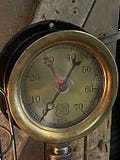For most folks, it’s just a thing that doesn’t have much meaning. It’s just a thing.
For some, it’s an accessory for some piece of steampunk furniture. While for others, it tells a story.
Everything can tell us a story if we are willing to look at it in the right light.
Sure, You Can Tell a Story, But Can You Read One?
By trade, I am a plant operator and maintenance technician. I have spent a lot of my life reading gauges and trying to determine what the gauge is telling me in regards to a piece of equipment. So I have an understanding of these kinds of things. However, I can articulate what I see of the story that this instrument is trying to tell and in doing so, hopefully I can get others to see something of the story of a thing that is common to their world.
Here is what I see.
For the length of a person’s shift or watch, this gauge ruled their world. Everything in their life was dependent on their ability to discern the information displayed. In order to properly understand what this thing is trying to tell us, it can potentially take years of dedication and study.
Fluid systems, power systems, steam systems, and mechanical systems are unimaginably complex, though they don’t always appear to be so and a plant operators worth (so far as employment is concerned) was-and-still-is determined by one’s ability to decipher what the gauge is telling him.
The system that this gauge is connected to affects some other part of the total system when it’s in operation. If the operator doesn’t properly understand what it’s telling him, then another part of the operation suffers and if that doesn’t get rectified, eventually a person’s family could suffer since the operating engineer or stoker could end up without a job.
An example of this could be a textile mill back in the late 1800’s or early 1900’s. A single steam engine often ran an entire mill. The single engine would power everything through a belt system. As more machinery was put on the line and load was placed on the engine, it would require more steam to maintain speed. Engine speed affected plant output.
As more steam was required, more heat and water would need to be supplied to the boiler, which was manually fired and the boiler water level manually maintained. A steam gauge and water level gauge ruled the world of the stokers. A large drop in steam pressure and the engine slowed down. Too little water in the boiler and the boiler could explode. Too much heat resulted in wasted fuel and energy and too much water could mean that water would enter the steam piping and cause valve or engine damage.
Any one of these things could result in a man losing his job, which would’ve been catastrophic to his family.
Why Does Any of This Matter?
To me, I see in this steam gauge a man that is dedicated to his work in a way that people really aren’t today. Some of it in study. Some of it in practice, but dedication to his work nonetheless, because not being dedicated could be catastrophic.
What would it take for us to be more dedicated to what matters most to us?





